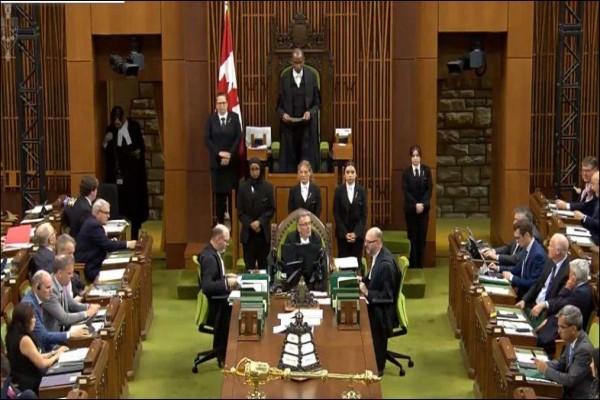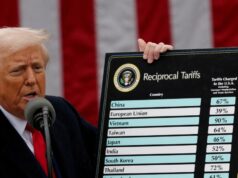On Monday, June 17, the same day that the U.S. National Security Adviser Jake Sullivan was in New Delhi to co-chair the second meeting of the United States–India Initiative on Critical and Emerging Technology, or iCET, there were two other events taking place back in the U.S.
One, Nikhil Gupta, an Indian accused by the US Federal prosecutors of plotting with an Indian government official to kill Gurpatwant Singh Pannun — a shady Khalistani activist who holds dual American-Canadian citizenship — was brought before a .court in Manhattan, where he pleaded not guilty to murder-for-hire conspiracy charges. The next hearing is set for June 28.
Two, five senior Democrat Senators, led by Sen. Jeff Merkley (D-Ore.), wrote to Secretary of State Antony Blinken, demanding a “strong diplomatic response to ensure that all of those who were involved (in this alleged plot to take out Pannun) are held accountable.”
For those who came in late, this whole sordid saga began during the G20 summit in New Delhi in September last year. It was there that Canadian Prime Minister Justin Trudeau publicly accused the Indian government, and indirectly Prime Minister Narendra Modi, of plotting the murder of another Khalistani activist, Hardeep Singh Nijjar, a Canadian citizen known to be close to Pannun.
Nijjar was shot dead by two masked gunmen in the parking lot of the Guru Nanak Sikh Gurdwara in Surrey, British Columbia, on 18 June 2023.
When asked to present proof, all Trudeau could mumble was something about ‘credible allegations” and inputs from the “five eyes”, an Anglosphere intelligence alliance comprising the US, UK, Australia, Canada and New Zealand.
That didn’t stop him from making the same charges in the Canadian parliament.
India responded by insisting that the Canadian mission in India be scaled down dramatically to maintain parity, and talks on a trade treaty have been put on hold.
It’s been nine months since then, and there’s not been a shred of real evidence offered by Trudeau to back his allegation. Instead, on Tuesday, he led his parliament in observing a minute’s silence to mark one year since the killing of Nijjar. For a man wanted for murder and terrorism in India.
In response, the Indian Consulate General in Vancouver promptly announced a memorial service to remind the world of the bombing of Air India flight 182 (Kanishka) in which 329 people, including 86 children, were killed, by Khalistani activists like Nijjar.
A Memorial Service is scheduled at 1830 hrs on June 23, 2024 at the Air India Memorial at Stanley Park's Ceperley Playground area. @cgivancouver encourages members of the Indian Diaspora to join the event in a show of solidarity against terrorism. (3/3) @HCI_Ottawa pic.twitter.com/oQrr7ggomA
— India in Vancouver (@cgivancouver) June 18, 2024
But soon after Trudeau’s allegations in New Delhi in September, Washington announced that an Indian plot to kill Pannun had been foiled by US security services.
In June last year, Nikhil Gupta,52, was arrested in the Czech Republic at the request of the US government on charges of conspiring with senior Indian officials to assassinate Pannun in New York. A year later, the Czech courts finally agreed to extradite Gupta to the U.S, where he was brought last Friday, and presented before a Manhattan court on Monday.
India’s response: give evidence linking the government to the killing of Nijjar and the alleged attempt on Pannun, and it would investigate the case in good faith.
In Canada, Trudeau’s government exists on the support of the New Democratic party led by Jagmeet Singh, a virulent Khalistani. So it is no surprise that even when Khalistanis in Canada put out a hit list of Indian diplomats in the country, Trudeau brushed it off as “freedom of expression”. And Canadian politicians of all hues graced a Khalsa day event recently, where pro-Khalistani chants were constantly raised.
India had sought action against Nijjar, who settled in Canada in 1997, on the grounds that he was mastermind behind the Khalistan Tiger Force (KTF), a banned militant group in the country. He was also wanted under India’s Terrorist Act for several cases, including a cinema bombing in Punjab that killed six people and injured 40 in 2007.
But Canada brushed off these requests, insisting Nijjar was a peaceful ‘plumber’ and just another activist, who had no criminal cases against him in Canada. .
Pannun, on the other hand, is a lawyer who makes a living from getting political asylum for young Sikh migrants wanting to live in the US and Canada, by making them claim that they are persecuted in India because they want a homeland for Sikhs called Khalistan. And there are several “credible allegations” that Pannun is in cahoots with Pakistan’s intelligence services.
All this comes at a time when Washington and New Delhi are trying to deepen and widen their strategic relationship, in what Beijing sees as a clear attempt to clip its wings.
But at the risk of indulging in some whataboutery, it is a bit rich when Washington gives New Delhi sanctimonious homilies on democracy and freedom of expression, when it had no qualms about taking out Osama Bin Laden on Pakistani territory. Or bombing Iraq to the stone ages, killing thousands, on the basis of what they themselves later admitted was false evidence. And those are just two instances from a very very long list.
For those who doubt India’s democratic credentials, the recent elections should be an eye opener. Forget the fact that Narendra Modi returned to power, but without a majority, ensuring that he can no longer take arbitrary decisions without blowback.
Look at Amritpal Singh Sandhu, a radical pro-Khalistani separatist, who was elected a member of India’s parliament despite being jailed under India’s National Security Act.
Or Sarabjeet Singh Khalsa, who was elected as an Independent member of the Indian parliament in the recent elections from Faridkot, Punjab. He is the son of Beant Singh, the former bodyguard and one of the assassins of former Indian Prime Minister Indira Gandhi in October 1984.
So while allowing pro-Khalistani separatists to contest and win elections on Indian soil, India is being accused of targeting Khalistanis abroad.
Here’s the thing. Just like any other country, India will continue to act according to its own strategic interests. It may not be involved in the killing of Nijjar or the attempt on Pannun, but it should certainly retain the right to act if their host countries refuse to act against people or outfits that pose a threat to India’s national interests.
And the sooner the world comes to terms with this, the better.
In a career spanning three decades and counting, Ramananda (Ram to his friends) has been the foreign editor of The Telegraph, Outlook Magazine and the New Indian Express. He helped set up rediff.com’s editorial operations in San Jose and New York, helmed sify.com, and was the founder editor of India.com.
His work has featured in national and international publications like the Al Jazeera Centre for Studies, Global Times and Ashahi Shimbun. But his one constant over all these years, he says, has been the attempt to understand rising India’s place in the world.
He can rustle up a mean salad, his oil-less pepper chicken is to die for, and all it takes is some beer and rhythm and blues to rock his soul.
Talk to him about foreign and strategic affairs, media, South Asia, China, and of course India.





